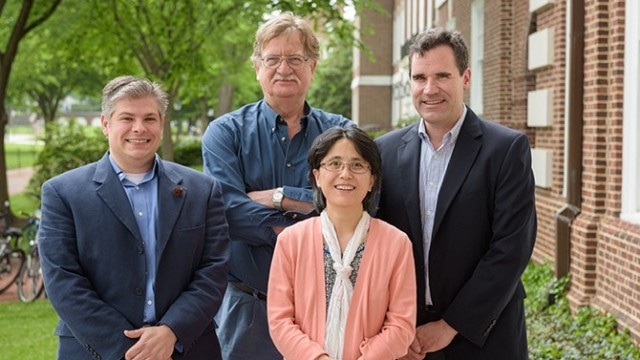Jun 6 2016
Bioorthogonal chemistry can be considered as a tactful concierge or valet that guides two global leaders to a confidential meeting without creating any sound or difficulty on the way.
 Joe Fox (right), professor of chemistry and biochemistry, collaborated with three UD colleagues on the work that has produced an important new catalytic tool. They are (from left) Joel Rosenthal (chemistry and biochemistry); Colin Thorpe (chemistry and biochemistry); and Xinqiao Jia (materials science and engineering).
Joe Fox (right), professor of chemistry and biochemistry, collaborated with three UD colleagues on the work that has produced an important new catalytic tool. They are (from left) Joel Rosenthal (chemistry and biochemistry); Colin Thorpe (chemistry and biochemistry); and Xinqiao Jia (materials science and engineering).
The valet can be considered as a kind of a catalyst that organizes the meeting to accelerate the outcome which would not occur otherwise. Similarly, reactions in living organisms, which do not occur spontaneously in nature, can be produced by bioorthogonal chemistry. It finds applications in developing materials or modifying the properties of existing materials, and also in nuclear medicine and cell imaging.
Four professors from University of Delaware (UD) have worked together to give the valet an advanced GPS and a turbo-charged engine, which permits faster, more accurate light that can be activated by enzyme or light, and will hence have more applications in the fields of engineering, medicine and other sciences. Their findings have been published in the Journal of the American Chemical Society.
This paper is one I'm really excited about. It is something that will be influencing what we do for years to come.
Joseph Fox from UD, an expert in the bioorthogonal chemistry field
Fox, a Professor of chemistry and biochemistry and of materials science and engineering, and a member of the UD-based National Institutes of Health Center of Biomedical Research Excellence on Molecular Discovery, has worked for around 10 years for developing the tool that is extensively being utilized in bioorthogonal chemistry. The reaction is referred to as tetrazine ligation, which has produced reactions at extremely high speed.
A process that activates tetrazine ligation with a small dose of the enzyme called horseradish peroxidase, or with red or near-infrared (NIR) light has been developed by Fox and his colleagues –Joel Rosenthal and Colin Thorpe, Professors of chemistry and biochemistry, and Xinqiao Jia of materials science, biomedical engineering and the Delaware Biotechnology Institute.
Fox said that more research has to be done before the process can be implemented in human beings. Nonetheless, the idea works and could be used in a variety of applications such as tissue engineering and drug delivery. For instance, the process can be used to alter the characteristics of an injectable a material after it has reached inside the diseased knee.
Fox hopes that this process would play a key role in Vice President Joe Biden's "cancer moonshot" initiative to support research that would ultimately result in better and more efficient tools against cancer.
One thing we're hopeful this will allow us to do is to localize catalysts on a tumor and catalyze this reaction on the tumor as a way of dropping off drugs, as opposed to chemotherapy which is toxic throughout. It will be part of the cancer story going forward.
Joseph Fox
All of Fox's colleagues in this project are experts in various fields. Biochemist Thorpe brought proficiency in kinetic and mechanistic analysis and suggested the use of horseradish enzyme. Jia brought proficiency in biomaterials, developing fibers and hydrogels. Rosenthal, an inorganic chemist, brought proficiency in photochemical and electrochemical processes.
The National Institutes of Health, the National Science Foundation, and the Osteo Science Foundation funded the research.
Source: http://www.udel.edu